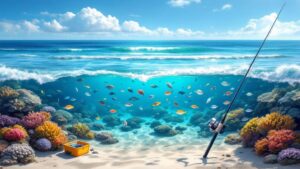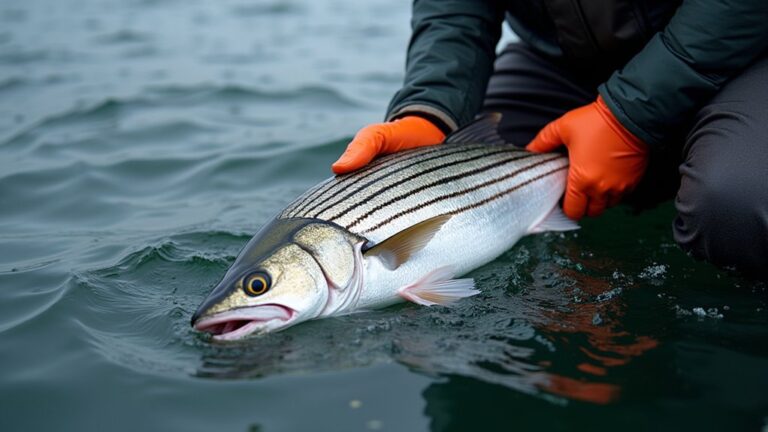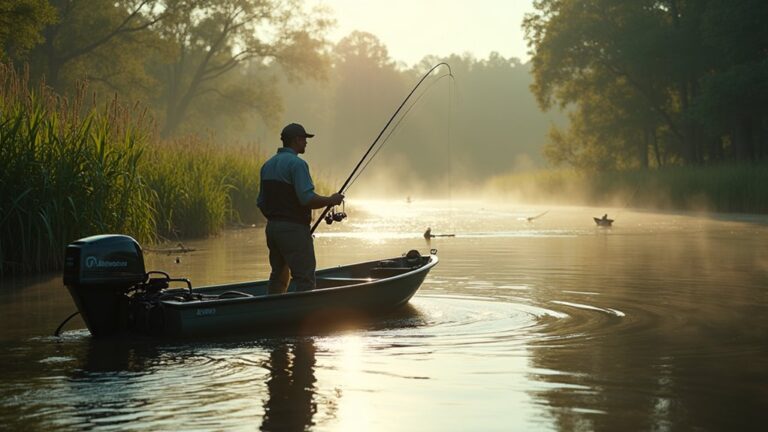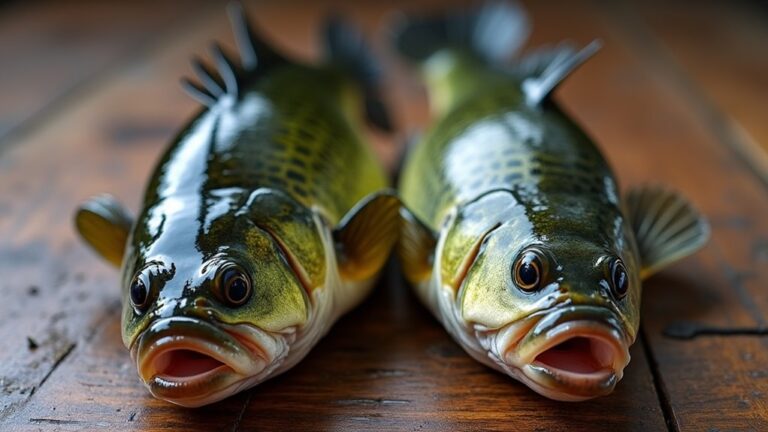Understanding saltwater fish regulations is essential for you as an angler. These rules safeguard fish populations and guarantee sustainable practices. You need to be aware of size and bag limits, which determine how many and which fish you can keep. Seasonal restrictions are in place to protect fish during critical spawning times, and permits may be required depending on your fishing methods. Don't forget about protected species; mishandling them can lead to serious consequences. By following these guidelines, you contribute to healthier ecosystems. If you want to know more about specific regulations and best practices, keep exploring.
Importance of Fishing Regulations
Understanding the importance of fishing regulations is fundamental for maintaining healthy marine ecosystems. These regulations play a significant role in guaranteeing the sustainability of fish populations and their habitats. When you follow these rules, you contribute to the overall health of our oceans and encourage biodiversity.
Regulations are designed to prevent overfishing, which can lead to drastic declines in fish populations. By adhering to these guidelines, you help protect not just the targeted species but also the entire marine ecosystem, including other wildlife that depends on those fish.
Additionally, healthy fish populations support recreational and commercial fishing, which many communities rely on for their livelihoods.
Fishing regulations also help guarantee that future generations can enjoy this crucial resource. When you respect these laws, you're playing a part in preserving marine environments for your children and grandchildren.
Engaging with your local fishery management and staying informed about updates can enhance your fishing experience while fostering a stronger sense of community responsibility.
In short, embracing fishing regulations is indispensable for everyone who loves the ocean and wants to preserve its beauty and bounty for years to come.
Size and Bag Limits
When you head out for a fishing trip, knowing the size and bag limits is crucial for responsible angling. These regulations help maintain sustainable fish populations and guarantee future fishing opportunities. Size limits dictate the minimum or maximum length of fish you can keep, while bag limits specify how many fish you can catch in a given period.
To make it easier, here's a table of common size and bag limits for popular saltwater species:
| Fish Species | Size Limit | Daily Bag Limit |
|---|---|---|
| Redfish | 18-27 inches | 1 |
| Snook | 28-33 inches | 1 |
| Flounder | 14 inches | 10 |
| Spotted Seatrout | 15 inches | 5 |
| Black Sea Bass | 14 inches | 5 |
Always double-check local regulations, as they can vary by location and season. Keeping within these limits not only protects the ecosystem but also enhances your fishing experience. Happy fishing!
Seasonal Restrictions
Beyond size and bag limits, seasonal restrictions play a significant role in saltwater fishing regulations. These restrictions help protect fish populations during their spawning periods, ensuring sustainable fishing for years to come.
Each species has specific seasons when they're either off-limits or more heavily monitored, so it's important to be aware of these dates. Before you head out, check the local regulations for the species you plan to target.
Some fish, like striped bass or redfish, have designated open and closed seasons. Fishing during the closed season can lead to hefty fines and damage to the fishery.
Additionally, seasonal restrictions can vary by region. What's legal in one state may not be in another, so always verify the rules for your specific location.
Permits and Licenses
Saltwater fishing enthusiasts must navigate the vital requirements for permits and licenses before casting their lines. Each state has its own regulations, so it's important to familiarize yourself with the specific rules in the area where you plan to fish.
Generally, you'll need a fishing license, which can often be obtained online, at local bait shops, or through state wildlife agencies.
Some regions require additional permits for specific species or fishing methods. For instance, if you're targeting certain game fish or fishing in designated waters, you might need a special tag or permit. Always check the local regulations to make sure you're compliant, as fines for fishing without the proper licenses can be steep.
If you're fishing from a charter boat, the captain usually holds the necessary licenses, but it's wise to confirm this before your trip.
Additionally, if you're planning to fish in federal waters, you may need a separate federal permit, especially for species like tuna or swordfish.
Protected Species
Understanding the significance of protected species is key for responsible saltwater fishing. These species, often threatened or endangered, play a fundamental role in maintaining the health of marine ecosystems. When you fish, it's important to know which species are protected in your area.
Catching or harming these fish can lead to severe legal repercussions and negatively impact the environment. Common examples of protected species include certain types of sharks, sea turtles, and various types of grouper. Regulations vary by location, so always check local guidelines before heading out.
If you happen to catch a protected species, it's critical to release it immediately and handle it with care to minimize stress and injury. In addition to legal implications, protecting these species guarantees the sustainability of fish populations for future generations.
Educating yourself about these regulations not only enhances your fishing experience but also fosters a sense of responsibility toward marine conservation. Remember, your actions can greatly influence the health of the oceans.
Best Practices for Responsible Fishing
Practicing responsible fishing not only enhances your experience but also protects marine ecosystems. When you engage in sustainable practices, you contribute to the health of fish populations and habitats.
Here are some best practices to keep in mind:
- Follow Regulations: Always check local fishing regulations, including size and bag limits. Adhering to these rules helps maintain balanced fish populations.
- Use Appropriate Gear: Select tackle and gear that minimize harm to fish. For example, use circle hooks to reduce gut hooking and consider using barbless hooks for easier catch and release.
- Catch and Release: If you're not keeping your catch, handle it gently. Wet your hands before touching the fish to protect its slime coat, and release it quickly to increase its chances of survival.
- Stay Informed: Stay updated on local conservation efforts and marine protected areas. Being informed helps you make better choices that support the ecosystem.
Conclusion
In summary, respecting saltwater fish regulations isn't just about following the rules; it's about preserving our oceans for future generations. When you know the size and bag limits, seasonal restrictions, and protected species, you're not just fishing—you're conserving. So, grab your gear, fish responsibly, and be the angler who makes a difference. Remember, every catch counts, and together, we can guarantee our waters remain vibrant and thriving for years to come.




